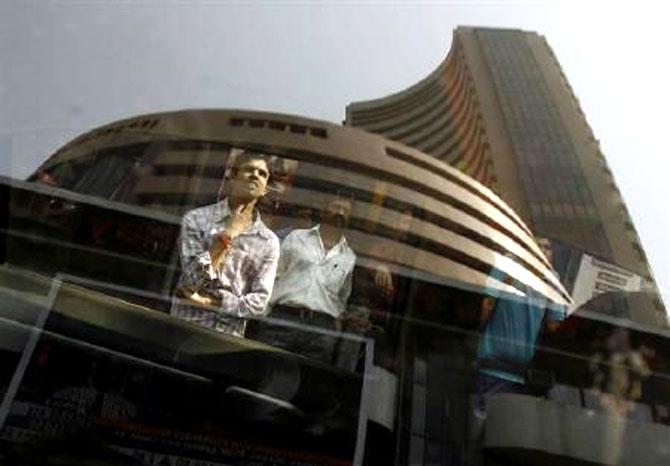Market players say the sell-off was triggered by pessimism that the government may not be able to balance growth with macro-stability.
Samie Modak reports.

The stock markets suffered their worst setback in 10 months on concern that the government's stimulus plan for the economy could disturb the fiscal math, and hurt the rupee and interest rates.
Market players said the sell-off was triggered by pessimism that the government may not be able to balance growth with macro-stability.
Meanwhile, the strengthening of the dollar on the US Federal Reserve's plan to trim its balance sheet, North Korea's new hydrogen bomb threat and S&P's downgrade of China also hurt investor sentiment towards emerging markets.
On the BSE, the benchmark Sensex ended at 31,922.44, down 447.6 points, or 1.4 per cent.
The Nifty 50 index on the National Stock Exchange lost 157.5 points, or 1.6 per cent, to 9,964.4.
Both posted their worst single-day fall since November 21, 2016. Investor wealth witnessed an erosion of Rs 2.7 lakh crore.
The rupee fell to 65.16 against the dollar, its lowest since March, before recovering over its previous day's close of 64.79.
The yield on the benchmark 10-year government bond in intra-day trade rose to 6.69 per cent, the highest since May, before closing at 6.67 per cent. A day earlier, the rupee and bond prices had seen sharp falls.
The government, already struggling to maintain 2017-18's fiscal deficit at 3.2 per cent of gross domestic product, seems likely to deviate from the earlier fiscal consolidation path.
Analysts said a widening deficit would lead to higher bond yields and interest rates, making the equity market relatively unattractive.
'A change in the fiscal consolidation road map has the potential to hurt sentiment among global investors,' said Gautam Chhaochharia, head of India research, and Tanvee Gupta Jain, India economist, at UBS Securities.
'Many global equity investors have looked at India favourably not only for its growth outlook but also as a robust macro story, reflected in falling inflation and stable currency.'
Foreign investors pulled out Rs 1,242 crore (Rs 12.42 billion) from domestic stocks on Friday, while domestic investor buying was relatively muted at Rs 520 crore (Rs 5.2 billion).
The India Volatility Index, a gauge for market volatility, surged 10 per cent.
Most Asian markets, too, ended weaker on Friday after North Korea threatened to conduct another hydrogen bomb test and S&P downgraded China for the first time since 1999.
Investor sentiment was already weak on the US Fed's plan to normalise its balance sheet.
"Asian equities have outperformed (this year) on the back of global economic recovery and continuing loose monetary stances by global central banks, leading to a weak dollar and strong flows into EM equities," said Manishi Raychaudhuri, head of Asia-Pacific equity research, BNP Paribas Securities.
"While the first driver seems likely to sustain, the second driver looks doubtful -- we think this constitutes possibly the only risk to EM equities presently," Raychaudhuri added.
Since August, foreign investors have pulled out over $2 billion from Indian markets.
Mutual funds, flushed with retail flows, have been big buyers of domestic stocks.
On a year-to-date basis, foreign institutional investors are still net buyers of India equities to the tune of Rs 42,000 crore (Rs 420 billion).
MFs have pumped Rs 75,700 crore (Rs 757 billion) during the period.
The Indian markets are among the best performing markets globally this year, having gained over 20 per cent.
The sharp gains, without earnings support, have driven the valuation of domestic equities to record highs.
The Nifty trades at a price-to-earnings multiple of 24.
Analysts fear a worsening economic outlook could delay earning recovery and hurt equity performance.
On Friday, there were four declining stocks for each one advancing.
The broader markets underperformed the benchmark indices, with the BSE Midcap index declining close to 3 per cent.
Metals, real estate and realty were the worst performing sectors.
All sectoral indices of the BSE ended in the red.
Among Sensex stocks, Tata Steel plunged nearly 5 per cent, after base metal prices fell due to China downgrade.
State Bank of India and ICICI Bank fell about 2 per cent each.
All Sensex stocks fell, with the exceptions of Wipro and Coal India.












 © 2025
© 2025